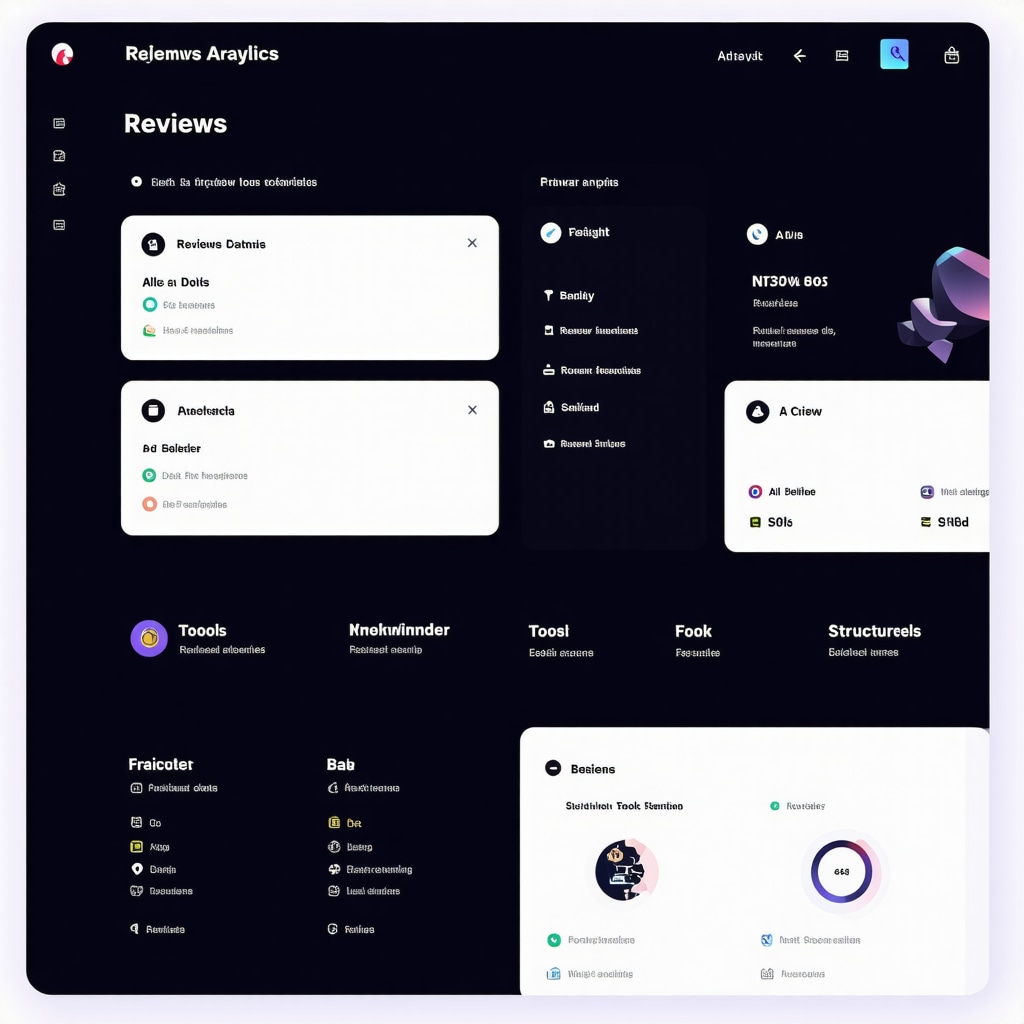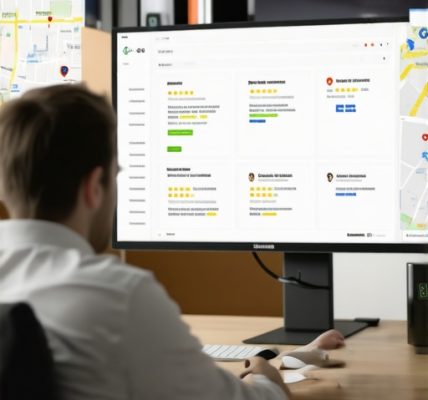The Critical Nexus Between Customer Reviews and Local SEO Performance
In the rapidly evolving landscape of local search, customer reviews have transcended mere reputation management to become a pivotal element influencing search engine rankings. As an SEO professional, understanding the nuanced interplay between consumer feedback and local search algorithms is essential for crafting strategies that elevate visibility and foster trust. The Google local algorithm considers review quantity, diversity, and recency, making reviews a dynamic signal for ranking local businesses.
Deciphering the Mechanisms: Why Reviews Are a Ranking Catalyst
Customer reviews serve as social proof, but their role in local SEO extends into algorithmic rankings through signals like review velocity, sentiment, and keyword-rich content. High review volumes with positive sentiment reinforce a business’s authority and relevance within a geographic locale. Moreover, reviews influence click-through rates and user engagement metrics, which Google interprets as indicators of quality and user satisfaction. For instance, consistent positive reviews with relevant keywords can propel a business into the coveted Google Local Pack.
Advanced Techniques for Leveraging Customer Feedback to Dominate Local Search
Strategic review management involves more than just soliciting feedback; it requires an integrated approach to optimize review profiles and amplify positive user signals. Employ tools like BrightLocal or GatherUp to monitor review trends and respond promptly, enhancing engagement and trustworthiness. Additionally, incorporating review snippets into your website’s schema markup can boost visibility in rich snippets, further improving local rankings. The importance of NAP (Name, Address, Phone Number) consistency across review sources remains critical, as discrepancies can undermine search engine trust.
What Are the Most Effective Tactics for Encouraging Genuine, Keyword-Optimized Customer Reviews Without Violating Platform Policies?
This question underscores the delicate balance between incentivizing reviews and maintaining compliance with review platform policies. Best practices include contextual, personalized requests that highlight the customer’s experience rather than generic prompts. Educating clients on the importance of authentic feedback and avoiding review gating are vital for maintaining review integrity and long-term SEO benefits. For comprehensive insights, consult our detailed guide on GMB review generation.
To stay ahead in local SEO, consider integrating review insights into your broader content and citation strategies. For example, showcasing top reviews in your local landing pages can enhance relevance and conversion rates. Regularly auditing your review profiles for consistency and quality ensures your reputation aligns with your SEO goals. As Google continues refining its local algorithm, the symbiotic relationship between customer reviews and local search performance remains a cornerstone of effective digital marketing.
For further expert strategies, explore our comprehensive local SEO optimization techniques.
Unveiling the Next Level: How Can Businesses Leverage Customer Reviews for Exponential Local Search Growth?
As local SEO continues to evolve, the emphasis on authentic, keyword-rich customer feedback becomes increasingly vital. To truly stand out, businesses must adopt innovative review management techniques that not only encourage genuine feedback but also strategically utilize reviews to enhance search engine algorithms. Incorporating structured data markup, such as schema.org review snippets, allows businesses to showcase star ratings directly in search results, significantly increasing visibility and click-through rates. Additionally, integrating reviews into targeted content marketing efforts—like blog posts, FAQs, and location pages—creates a rich, relevant narrative that reinforces local relevance and authority.
Why Is the Authenticity of Customer Reviews More Critical Than Ever?
Google’s algorithm updates have placed a premium on review authenticity, penalizing practices that appear manipulative or inauthentic. This shift underscores the importance of cultivating a review ecosystem rooted in genuine customer experiences. Platforms like Trustpilot and Google My Business prioritize reviews that demonstrate credibility, which in turn boosts local rankings. Moreover, reviews that naturally incorporate local keywords and specific service details are more impactful, helping businesses target niche search queries and improve ranking in highly competitive markets. For a comprehensive approach, explore our guide on advanced local SEO techniques.
What Are the Most Effective Strategies for Encouraging Authentic, Keyword-Optimized Customer Reviews at Scale?
This question challenges marketers to develop scalable, ethical review solicitation campaigns that prioritize authenticity. Successful tactics include personalized email requests post-purchase, leveraging SMS prompts, and incentivizing reviews with loyalty points rather than direct rewards. Educating customers on the value of their feedback and making the review process effortless—via direct links or review portals—further enhances participation rates. Integrating review collection with CRM systems enables targeted follow-ups and timing optimization. To ensure compliance with platform policies, avoid review gating and always encourage honest opinions. For more detailed tactics, see our article on GMB review generation best practices.
For businesses aiming to dominate local search, continuously analyzing review sentiment and integrating insights into your content and citation strategies can create a competitive edge. For instance, highlighting top reviews on your website or in Google Posts can reinforce your local authority. Regular audits of review profiles ensure consistency and help identify areas for improvement, aligning reputation management with SEO objectives.
To stay informed on the latest review management innovations, consider consulting our comprehensive local SEO strategy.
Harnessing the Power of User-Generated Content: Beyond Basic Review Collection
While collecting reviews is a foundational step, truly advanced local SEO strategies involve transforming these insights into multifaceted assets that enhance your digital footprint. Implementing review syndication across multiple platforms—not just Google My Business—amplifies your presence and signals authority to search engines. Consider integrating reviews into your content marketing initiatives, such as embedding top customer testimonials within your location pages or blog posts, thereby reinforcing relevance with keyword-rich narratives.
Implementing Structured Data Markup for Maximum Visibility
Structured data markup, particularly schema.org review snippets, plays a critical role in elevating your local search visibility. By accurately implementing schema markup on your website, you enable search engines to display star ratings directly in search results, which significantly enhances click-through rates. This process involves careful validation to prevent markup errors that could diminish your rich snippet potential. Regular audits using tools like Google’s Rich Results Test ensure your structured data remains compliant and effective.
Deep Dive: How Can Artificial Intelligence Enhance Review Management?
Emerging AI-driven tools are revolutionizing review management by providing sentiment analysis, trend detection, and predictive insights. Platforms integrating natural language processing (NLP) can analyze vast volumes of reviews to identify common themes, emerging issues, or opportunities for engagement. For example, AI can automatically flag negative reviews that require immediate response or suggest optimized responses based on past interactions, ensuring your reputation management remains proactive and data-driven. According to a recent study by Sage Journals, AI analytics significantly improve response times and sentiment accuracy, translating into better SEO outcomes.
What Are the Nuances of Using AI for Large-Scale Review Optimization Without Sacrificing Authenticity?
While AI offers remarkable efficiencies, maintaining review authenticity is paramount. Over-reliance on automated responses may risk sounding impersonal or manipulative, which can harm your credibility and violate platform policies. The key is to leverage AI as an assistive tool—generating response drafts or identifying review patterns—while ensuring human oversight to inject genuine tone and personalization. This balanced approach ensures your reputation signals remain credible and compliant with platform standards.
To deepen your mastery, consider exploring advanced tools like BirdEye or ReviewTrackers, which integrate AI capabilities for comprehensive review insights and management.
Integrating Review Insights into Local SEO and Content Architecture
Strategic integration of review insights extends beyond reputation management into the core of your SEO and content strategy. For instance, analyzing frequent keywords and service mentions within reviews can inform your keyword targeting and help craft hyper-relevant content. Creating FAQ sections or service pages that directly address common customer concerns—highlighted in reviews—can also improve your relevance in niche search queries. Additionally, showcasing positive reviews and star ratings on your homepage or service pages boosts social proof, encouraging conversions and reducing bounce rates.
Conclusion: Evolving with the Review Ecosystem for Sustained Local SEO Leadership
As the local search landscape becomes increasingly sophisticated, the integration of advanced review management, structured data, AI analytics, and content alignment forms the cornerstone of a resilient SEO strategy. Continual monitoring and adaptation ensure your business remains visible, authoritative, and trusted in your community. For those committed to mastery, engaging with cutting-edge tools and staying informed about platform policy updates are essential practices that can elevate your local SEO game from good to exceptional.

Leveraging Sentiment Analysis for Fine-Tuned Review Optimization
Harnessing sentiment analysis through sophisticated NLP tools enables businesses to decipher the emotional tone behind reviews, allowing for more targeted reputation management. By identifying recurring themes—whether positive or negative—companies can proactively address issues and amplify strengths. For example, integrating sentiment insights with customer feedback systems facilitates real-time adjustments in service delivery or marketing messaging, enhancing overall local SEO effectiveness.
How Can Businesses Integrate Voice Search Optimization with Customer Feedback?
With the rising prominence of voice search, embedding natural language keywords derived from customer reviews into your content can significantly improve voice search visibility. Analyzing review language patterns reveals conversational keywords and local phrases to incorporate into FAQs, service descriptions, and location pages. This strategic alignment ensures your business remains accessible via voice queries, capturing a broader segment of local searches.
External Source: The Role of Google’s BERT Algorithm in Review-Based SEO
Google’s BERT update emphasizes understanding context and intent within search queries, affecting how review content impacts rankings. According to Google’s official blog, BERT enables more nuanced comprehension of user language, making relevant, contextually rich reviews more influential in search results. Ensuring reviews include detailed, descriptive language aligned with customer intent can enhance their SEO impact in the BERT era.
What Are the Cutting-Edge Tools for Automated Review Sentiment and Keyword Extraction?
Advanced tools like MonkeyLearn, Lexalytics, and Brandwatch utilize AI to automate sentiment analysis and extract high-value keywords from large review datasets. These platforms enable marketers to identify emerging trends, optimize review prompts, and tailor content strategies accordingly. Leveraging such technology ensures your review management remains scalable, precise, and aligned with the latest SEO innovations.
Engaging with these sophisticated tools and strategies empowers your business to harness the full potential of customer reviews, transforming reputation signals into powerful SEO assets that outperform competitors and elevate your local search presence to new heights.
Expert Insights & Advanced Considerations
1. Prioritize Authenticity with AI-Enhanced Monitoring
Utilize AI-driven sentiment analysis tools to ensure reviews remain genuine while gaining insights into customer perceptions, allowing for proactive reputation management that aligns with evolving search engine algorithms.
2. Leverage Structured Data for Rich Snippets
Implement schema.org review markup meticulously to enhance your visibility in local search results, ensuring your star ratings stand out and attract higher click-through rates, especially vital in competitive markets.
3. Integrate Voice Search Optimization into Customer Feedback
Analyze review language for natural, conversational keywords that can be embedded into your content, FAQs, and service descriptions to capitalize on voice search trends and improve local discoverability.
4. Foster a Review Ecosystem Across Multiple Platforms
Expand review collection beyond Google My Business by syndicating reviews on industry-specific directories and your website, creating a comprehensive reputation profile that search engines favor and users trust.
5. Use Review Insights to Inform Content and SEO Strategies
Extract keywords and common themes from reviews to optimize your service pages, FAQs, and blog content, creating a feedback loop that continuously enhances relevance and authority in local search.
Curated Expert Resources
- BrightLocal Blog: Offers advanced local SEO tactics and review management techniques tailored for 2025 challenges.
- Schema.org Documentation: Essential for implementing and validating structured data markup effectively.
- Sage Journals & NLP Research: Provides cutting-edge insights into sentiment analysis and AI applications in reputation management.
- Google’s Official BERT & Rich Results Guides: Critical for understanding how context and structured data influence search rankings.
- Review Management Platforms (BirdEye, ReviewTrackers): Industry leaders integrating AI to streamline review analysis and response strategies.
Final Expert Perspective
In the rapidly advancing realm of local SEO, mastering the strategic use of customer reviews is not just about collection but about intelligent integration—leveraging AI, structured data, and content optimization—to secure a competitive edge. As search engines evolve, so must your approach, turning reviews into powerful assets that drive visibility, trust, and growth. Engage with these expert resources and consider consulting seasoned professionals to refine your review strategy and stay ahead in 2025 and beyond. For a personalized consultation, reach out via our contact page and elevate your local search presence today.


